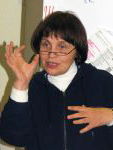Abstract
Development of modern school physics experiment is related to the extensive use of ICT not only for data processing and visualization. Interactive computer simulation for processes and phenomena, developed by scientists and methodologists by the site Phet, helps to improve the physical demonstration experiment with the support of modern pedagogical technologies that change the traditional procedure to form students' understanding of the processes and phenomena, active cognitive activity. To study the influence of methods to integrate interactive computer simulations for better understanding the students' physical processes, phenomena and laws of the international community, teachers and Ukrainian scientists and teachers of physics have been involved. The aim of the article is to introduce the research results in the development and testing of individual components of educational technology in performing a physical experiment in secondary school.References
Гальперин П. Я. Основные результаты исследования по проблеме «Формирование умственных действий и понятий". – М : Изд-во МГУ, 1965. – 52 с.
Дементієвська Н. П. Застосування інтерактивних онлайнових моделювань при виконанні лабораторних робіт з фізики / Дементієвська Н. П. // «Інформаційні технології і засоби навчання». [Електронний ресурс]. – К. : ІІТЗН НАПН України. – 2013. – Том 36, №4. – Режим доступу : http://lib.iitta.gov.ua/4589/. – С. 27–39.
Жук Ю. О. Фізичний експеримент у загальноосвітньому навчальному закладі : навчальний посібник / Жук Ю. О., Гуржій А. М., Величко Н. О.. – К. : ІЗМН, 1999. – 306 с.
Ельцов А. В. Современные компьютерные технологи в учебном эксперименте по физике / Ельцов А. В., Захаркин И. А. // Вестник рязанского государственного университета им. С. А. Есенина. – Выпуск № 14. – 2007.
Козел В. М. Демонстраційний експеримент на екрані комп’ютера, [Електронна публікація] / В. М. Козел, Д. А. Степанчиков, М. В. Федьович. – Режим доступу : http://studentam.net.ua/content/view/7411/97/.
Машбиц Е. И. Компьютеризация обучения: проблемы и перспективы / Е. И. Машбиц.– М. : Знание, 1986. – 80 с.
Рубинштейн С. . Основы общей психологи / С. Рубинштейн. – М. : Учпедгиз, 1946. – 416 с.
Crouch, C. H., Fagen, A. P., Callan, J. P., Mazur, E., Amer. J. // Phys. – #72. – 2004. – Рp. 835–838.
Noah Finkelstein, Wendy Adams, Christopher Keller, Katherine Perkins, Carl Wieman and the Physics Education Technology Project Team, High-Tech Tools for Teaching Physics: the Physics Education Technology Project. // MERLOT Journal of Online Learning and Teaching. – Vol. 2. – No. 3, September 2006. – Режим доступу : http://jolt.merlot.org/vol2no3/finkelstein.htm.
Wendy K. Adams, Archie Paulson and Carl E. Wieman, What Levels of Guidance Promote Engaged Exploration with Interactive Simulations? [Електронний ресурс]. – Режим доступу : http://phet.colorado.edu/publications/PERC_Interview_Guidance.pdf.
REFERENCES (TRANSLATED AND TRANSLITERATED)
Galperin P. J. Main results of the research on "The formation of mental actions and concepts"/ P. J. Galperin // M. : Publ. MGU, 1965. – 52p. (in Russian).
Dementievska N. P. Application of interactive online simulations in the physics laboratory activities [online] / N. P. Dementievska // Electronic scientific magazine "Technology and learning tools". – 4 (36). – 2013. – Available from : http://lib.iitta.gov.ua/4589/ (in Ukrainian).
Zhuk U. O., Gurzhiy A. M., Velichko N. O. Physical experiments in secondary schools (manual) / U. O. Zhuk, A. M. Gurzhiy, N. O. Velichko // IZMN. – 1999. – Kiyv. – 306 p. (in Ukrainian).
El'tsov A. V. Modern computer technologies in educational experiment in physics / A. V. El'tsov, I. A. Zaharkin // Journal of the Ryazan State University by S. A. Esenina. – Issue number 14/2007.(in Russian).
Kozel V. M. Demonstration experiment on the computer screen / V. M. Kozel, D. A. Stepanchikov, M. V. Fedovych [online]. – Available from : http://studentam.net.ua/content/view/7411/97/ (in Ukrainian).
Mashbits E. I. Computerization of education: problems and prospects. – M. : Znanie, 1986. – 80 p. (in Russian).
Rubinstein S. L. Fundamentals of general psychology / S. L. Rubinstein. – M. : Uchpedgiz, 1946. – 416 р. (in Russian).
Crouch, C. H., Fagen, A. P., Callan, J. P., Mazur, E., Amer. J. // Phys. – #72. – 2004. – Рp. 835–838 (in English).
Noah Finkelstein, Wendy Adams, Christopher Keller, Katherine Perkins, Carl Wieman and the Physics Education Technology Project Team, High-Tech Tools for Teaching Physics: the Physics Education Technology Project, MERLOT Journal of Online Learning and Teaching. –Vol. 2. – No. 3, September 2006, [online]. – Available from : http://jolt.merlot.org/vol2no3/finkelstein.htm (in English).
Wendy K. Adams, Archie Paulson and Carl E. Wieman, What Levels of Guidance Promote Engaged Exploration with Interactive Simulations? [online]. – Available from : http://phet.colorado.edu/publications/PERC_Interview_Guidance.pdf (in English).
Authors who publish in this journal agree to the following terms:
- Authors hold copyright immediately after publication of their works and retain publishing rights without any restrictions.
- The copyright commencement date complies the publication date of the issue, where the article is included in.
Content Licensing
- Authors grant the journal a right of the first publication of the work under a Creative Commons Attribution-NonCommercial-ShareAlike 4.0 International License (CC BY-NC-SA 4.0) that allows others freely to read, download, copy and print submissions, search content and link to published articles, disseminate their full text and use them for any legitimate non-commercial purposes (i.e. educational or scientific) with the mandatory reference to the article’s authors and initial publication in this journal.
- Original published articles cannot be used by users (exept authors) for commercial purposes or distributed by third-party intermediary organizations for a fee.
Deposit Policy
- Authors are permitted and encouraged to post their work online (e.g., in institutional repositories or on their website) during the editorial process, as it can lead to productive exchanges, as well as earlier and greater citation of published work (see this journal’s registered deposit policy at Sherpa/Romeo directory).
- Authors are able to enter into separate, additional contractual arrangements for the non-exclusive distribution of the journal's published version of the work (e.g., post it to an institutional repository or publish it in a book), with an acknowledgement of its initial publication in this journal.
- Post-print (post-refereeing manuscript version) and publisher's PDF-version self-archiving is allowed.
- Archiving the pre-print (pre-refereeing manuscript version) not allowed.

